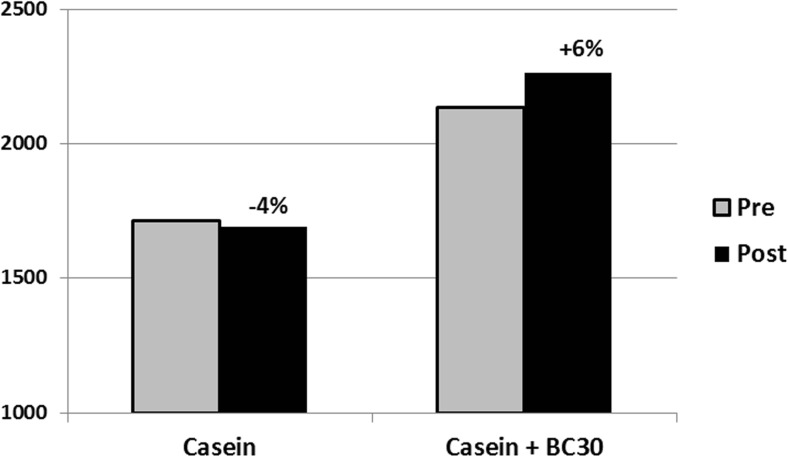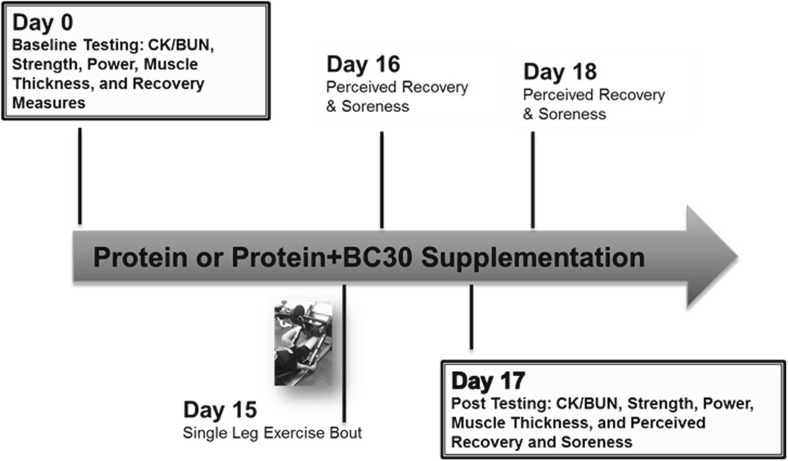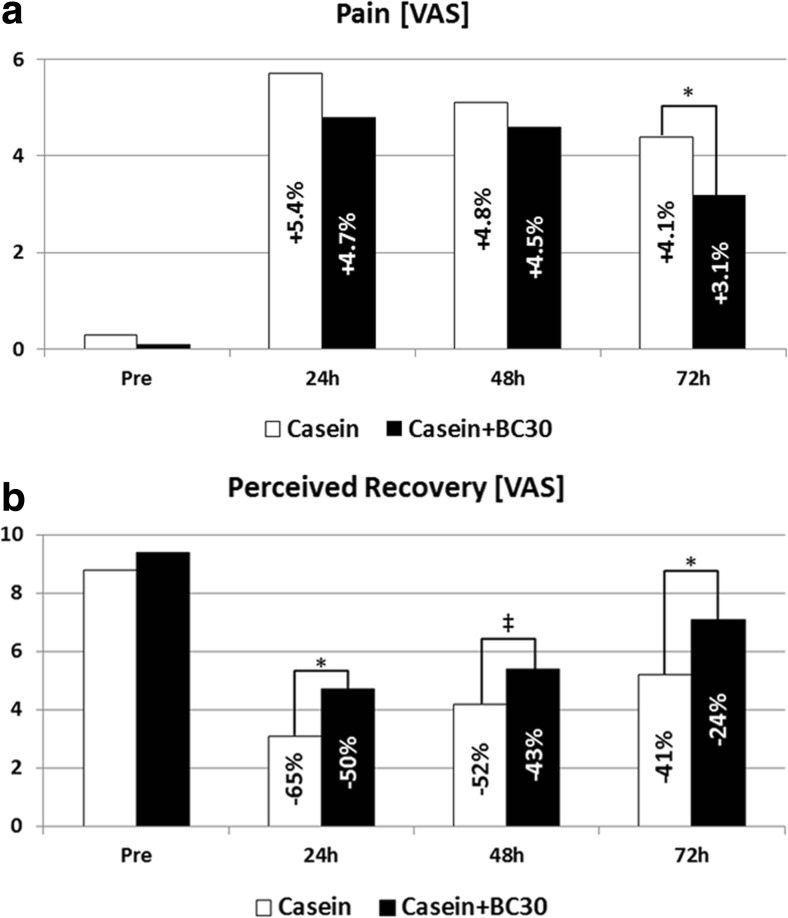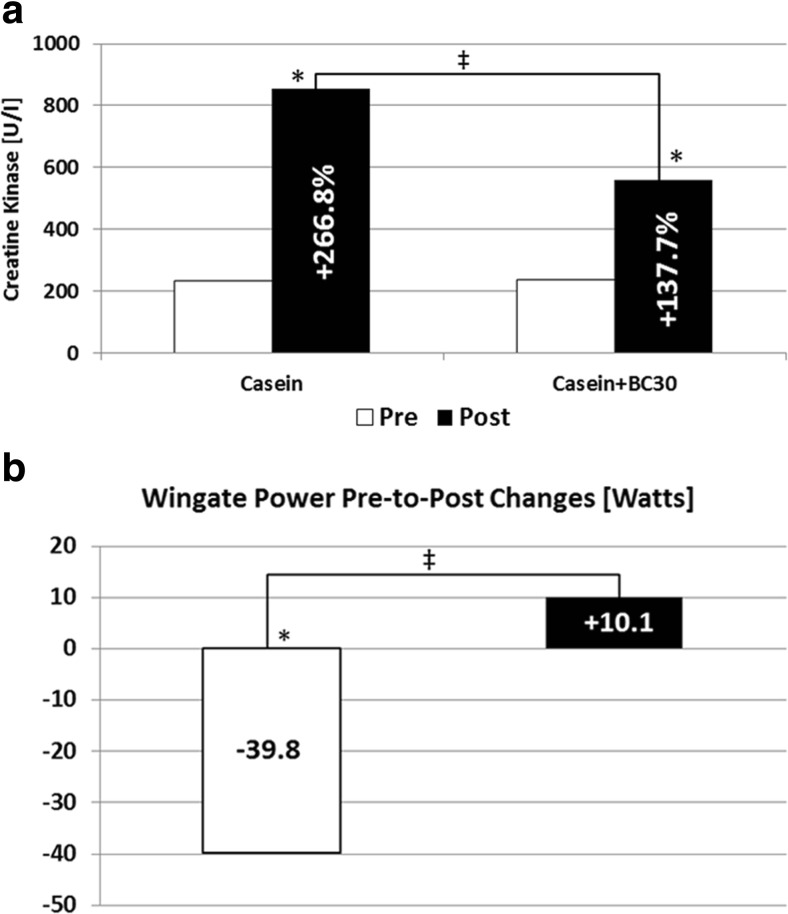Abstract
Probiotics offer numerous health benefits, including digestive and immune health. Improved digestive health is linked to a more efficient absorption of important nutrients from our diet. This review focused on the rationale of using the probiotic Bacillus coagulans GBI-30, 6086 to aid protein absorption and utilization. B. coagulans GBI-30, 6086 can withstand the acidic environment of the stomach to reach the intestine where it germinates. Once active in the small intestine after germination, it has been shown to aid the digestion of carbohydrates and proteins. Co-administration of B. coagulans GBI-30, 6086 with protein has been shown to increase protein absorption and to maximize the health benefits associated with protein supplementation.
Keywords: Bacillus coagulans, Probiotic, Protein, Nutrient absorption, Intestinal microbiota
Introduction
Probiotics are live microorganisms that, when administered in adequate amounts, confer a health benefit on the host [1]. Probiotics modulate the growth or survival of bacteria in the gut lumen, improve mucosal barrier function, and affect the mucosal and systemic immune system [2]. The large intestine is the most heavily colonized organ in the human body, and stress, diet, infections, living conditions, and antimicrobial intake can negatively affect the microflora composition [3]. Probiotics administration beneficially influences nutrient absorption and availability. Probiotics can optimize mineral absorption possibly through changes in the pH levels, have major impact on carbohydrate digestion through the production of digestive enzymes, can reduce cholesterol levels through degrading cholesterol in the gut, and can even produce vital nutrients, including the synthesis of various vitamins (for a recent review, see [4]). Efficacy of all probiotics is strain specific, and effects of one strain cannot be assumed on another strain unless proven through clinical trials.
The probiotic Bacillus coagulans GBI-30, 6086 (GanedenBC30) [5] is a lactic acid producing, spore-forming bacterial species. Due to the formation of spores, B. coagulans can withstand the acidic environment of the stomach to reach the intestine where it germinates. Once active in the small intestine after germination, it has been shown to aid the digestion of carbohydrates and proteins [6]. Consumption of B. coagulans GBI-30, 6086 creates an intestinal environment that is not hospitable to various pathogens, creating a healthier and more efficient intestinal tract that is better able to utilize nutrients that have been consumed [7]. In addition to better utilization of consumed foods, B. coagulans GBI-30, 6086 increases the benefits of prebiotics by promoting populations of beneficial bacteria as well as the production of short-chain fatty acids essential for the health of cells lining the gut [8]. B. coagulans GBI-30, 6086 has been shown to improve dysbiosis by increasing the groups of beneficial bacteria [9]. The modulation of the gut microbiota results in a decrease of abdominal pain and bloating in subjects with irritable bowel syndrome (IBS) [], reduces the number of daily bowel movements in subjects with diarrhea-predominant IBS [11] as well as a decrease gas and bloating and improve quality of life in subjects with post prandial intestinal gas symptoms [12]. The strain has also shown anti-inflammatory and immune modulating effects [13, 14]. B. coagulans GBI-30, 6086 has a history of safe use and is safe for chronic human consumption based upon toxicology testing, even when the product is consumed in high quantities [15, 16].
Here, we review the effect of B. coagulans GBI-30, 6086 on protein digestion and utilization.
Increasing Protein and Carbohydrate Metabolism in an In Vitro Gut Model
The survival and the ability to aid the digestion of protein and carbohydrates of B. coagulans GBI-30, 6086 was tested in an in vitro model of the stomach and small intestine (TIM-1) [6]. Under the tested condition, the survival of strain was high (70%). B. coagulans GBI-30, 6086 produces enzymes that have been shown to aid the breakdown of protein and a wide variety of carbohydrates [5]. The addition of B. coagulans GBI-30, 6086 to milk protein increased the amount of digested milk protein available for absorption.
Increasing Protein Absorption in a Mini-swine Animal Model
B. coagulans GBI-30, 6086 has been shown to increase protein utilization in a mini-swine animal model by 10% after 4–5-month-old male mini-swine were fed either a certified diet only or certified diet plus 1 billion CFU B. coagulans GBI-30, 6086 per pig per day for 4 weeks.
Increasing Amino Acid Appearance in the Blood in Humans
B. coagulans produce digestive enzymes that are active under gut conditions (alkaline proteases, etc.) and these proteases have been shown to increase amino acid appearance in the blood when co-administered with protein [17]. In addition, B. coagulans GBI-30, 6086 enhances the health of the cells of the gut lining by decreasing inflammation, thereby improving nutrient absorption through optimum development of the absorptive area of the villi [14]. The benefits of B. coagulans GBI-30, 6086 on protein absorption overserved in the in vitro model and an animal model were confirmed in a randomized, double-blind, placebo-controlled, crossover human clinical trial. Healthy subjects consumed either whey protein or whey protein plus 1 billion CFU B. coagulans GBI-30, 6086 for 2 weeks. B. coagulans GBI-30, 6086 increased absorption of amino acids of specific importance to athletes and people interested in muscle health, including BCAAs (leucine, isoleucine, valine), or amino acids involved in blood flow regulation, such as citrulline, or recovery (glutamine).
Increasing Muscle Health in Athletes: Reduced Exercise-Induced Muscle Damage and Increased Recovery
Skeletal muscle mass is the sum of muscle protein breakdown (MPS) and muscle protein synthesis (MPS). The protein kinase mechanistic target of rapamycin (mTOR) has been widely recognized as a key regulator of MPS and muscle mass. Mechanical stimulation of mTOR through weight-bearing exercise, or dietary activation through protein ingestion both stimulate MPS and are additive when protein consumption follows exercise. The recommended daily protein intake to maintain nitrogen balance (muscle mass) is 0.8 g protein/kg body weight/day, however, people trying to increase muscle mass should increase their daily protein intake to 1.4–2.0 g protein/kg body weight/day. Optimal protein intake per serving for people trying to maximize MPS are 20–25 g of a high-quality protein, containing 2–3 g of leucine, to be consumed every 3–4 h. Ingestion of higher amounts of protein does not further stimulate MPS. Rapidly digested proteins that contain high proportions of essential amino acids (EAA), of which the key amino acid appears to be leucine, are more effective in stimulating MPS than other proteins [18].
Post-workout administration of slow digesting proteins such as casein show suboptimal results on MPS in comparison to fast absorbed proteins such as whey. B. coagulans GBI-30, 6086 has been shown to increase EAA absorption, including leucine absorption by 20%. The potential beneficial effects of co-administration of the probiotic B. coagulans GBI-30, 6086 with a slow digested protein on body composition and sports performance has been studied in a pilot trial [19]. Healthy resistance-trained individuals consumed either 20 g of casein or 20 g of casein plus 500 million CFU B. coagulans GBI-30, 6086 twice daily in combination with a resistance training program, consisting of full body workouts 4 times per week for 8 weeks. The addition of B. coagulans GBI-30, 6086 showed a trend (p = 0.10) to increase vertical jump power in comparison to casein alone, and might had a beneficial effect on peak power and fat mass (Fig. 1).
Fig. 1.
Co-administration of 20 g casein and 500 million CFU BC30 (B. coagulans GBI-30, 6086) twice daily tended to increase vertical jump peak power over casein alone following an 8-week resistance training program [19]
There were no significant differences between groups for body composition, or other performance measures. This pilot study indicated that probiotic supplementation in form of B. coagulans GBI-30, 6086 in combination with a slow digesting protein trended to increase athletic performance.
The beneficial effects observed in vertical jump performance might be based on aiding muscle recovery through gut microbial modulation. A follow-up study investigated if the co-administration of B. coagulans GBI-30, 6086 with protein has beneficial effects on muscle damage, performance, and recovery following a muscle-damaging exercise bout [20]. Recreationally trained males consumed 20 g casein, and following a 1 week wash-out period 20 g of casein plus 1 billion CFU B. coagulans GBI-30, 6086 daily for 2 weeks. Participants performed a muscle-damaging one-legged exercise bout and perceived recovery, muscle soreness, strength and power, as well as markers of muscle damage and hypertrophy were measured post exercise (Fig. 2).
Fig. 2.
Study design investigating the effects of B. coagulans GBI-30, 6086 following a muscle-damaging exercise [20]
The muscle-damaging exercise significantly increased muscle soreness and reduced perceived recovery in the protein alone group. However, the co-administration of B. coagulans GBI-30, 6086 with casein significantly reduced soreness and increased perceived recovery (Fig. 3).
Fig. 3.
B. coagulans GBI-30, 6086 significantly reduced subjected feelings of perceived muscle soreness (left) and increased perceived recovery (right) from muscle-damaging exercise using a visual analogue scale (VAS) [20]
The subjective measures were confirmed by blood markers of muscle damage. Co-administration of B. coagulans GBI-30, 6086 reduced the observed increase in muscle damage. Exercise performed, as measured through the Wingate cycle ergometer test determining peak power, significantly decreased athletic performance in the casein group whereas co-administration of B. coagulans GBI-30, 6086 and casein prevented the decline. The addition of B. coagulans GBI-30, 6086 to casein did not further improve body composition or strength (Fig. 4).
Fig. 4.
B. coagulans GBI-30, 6086 reduces muscle damage (left) and beneficially effects subsequent performance (right) following a bout of muscle-damaging exercise [20]
Reduced muscle damage and faster recovery may lead to an enhanced adaptation rate to training and subsequent to a faster increase in hypertrophy and performance. Exercise-induced skeletal muscle tissue damage occurs as a result of the forced lengthening of active muscle, which directly causes microtears of the myofibrils, resulting in muscle soreness and swelling, and decreased forced production. The initial reaction is followed by a secondary inflammatory response integral to skeletal muscle repair and recovery response. While muscle damage appears to be an important component of muscular adaptation to exercise, a reduction and not a complete prevention of muscle damage, as shown by the addition of B. coagulans GBI-30, 6086 to casein, might be optimal.
Probiotic Health Benefits in Active People
In addition to improved nutrient absorption and production, regular probiotic supplementation has been linked to improved digestive and immune health, both crucial to athletes, as severe exercise has been linked to increased gut permeability and suppressed immune health. Moderate intensity exercise reduces the infection risk, while high-intensity exercise actually increases infection risk. Immune suppression in athletes worsens by psychological stress, environmental extremes, exposure to large crowds, or increased exposure to pathogens due to elevated breathing during exercise [21]. Probiotic supplementation in athletes has been reported to reduce the number, severity, and duration of upper respiratory infections and gastrointestinal distress in athletes [22].
Concluding Remarks
The probiotic B. coagulans GBI-30, 6086 improves protein absorption and utilization and thereby optimizes the health benefits associated with protein supplementation. Based on the improved digestion of protein, B. coagulans GBI-30, 6086 could be used to improve muscle health in various populations and reduce quality differences of protein sources naturally lower in leucine, such as plant proteins.
Compliance with Ethical Standards
Competing Interests
RJ and MP have received research grants from Ganeden Biotech Inc. SF, HC and DK are employed by Ganeden Biotech Inc., which engages in business trade of B. coagulans GBI-30, 6086.
References
- 1.World Health Organization (2001) Food and Agricultural Organization of the United Nations and World Health Organization. Health and nutrition properties of probiotics in food including powder milk and live lactic acid bacteria. ISBN 92-5-105513-0
- 2.Pyne DB, West NP, Cox AJ, Cripps AW. Probiotics supplementation for athletes—clinical and physiological effects. Eur J Sport Sci. 2015;15(1):63–72. doi: 10.1080/17461391.2014.971879. [DOI] [PubMed] [Google Scholar]
- 3.Holmes E, Kinross J, Gibson GR, Burcelin R, Jia W, Pettersson S, Nicholson JK. Therapeutic modulation of microbiota-host metabolic interactions. Sci Transl Med. 2012;4(137):137rv6. doi: 10.1126/scitranslmed.3004244. [DOI] [PubMed] [Google Scholar]
- 4.Yoo JY, Kim SS. Probiotics and prebiotics: present status and future perspective on metabolic disorders. Nutrients. 2016;8(3):173. doi: 10.3390/nu8030173. [DOI] [PMC free article] [PubMed] [Google Scholar]
- 5.Keller David, Farmer Sean, McCartney Anne, Gibson Glenn. Bacillus coagulansas a probiotic. Food Science & Technology Bulletin: Functional Foods. 2010;7(7):103–109. [Google Scholar]
- 6.Matthuis AJH, Keller D, Farmer S. Survival and metabolic activity of the GanedenBC30 strain of Bacillus coagulans in a dynamic in vitro model of the stomach and small intestine. Benef Microbes. 2010;1(1):31–36. doi: 10.3920/BM2009.0009. [DOI] [PubMed] [Google Scholar]
- 7.Honda H, Gibson GR, Farmer S, Keller D, McCartney AL. Use of a continuous culture fermentation system to investigate the effect of GanedenBC30 (Bacillus coagulans GBI-30, 6086) supplementation on pathogen survival in the human gut microbiota. Anaerobe. 2011;17(1):36–42. doi: 10.1016/j.anaerobe.2010.12.006. [DOI] [PubMed] [Google Scholar]
- 8.Nyangale EP, Farmer S, Keller D, Chernoff D, Gibson GR. Effect of prebiotics on the fecal microbiota of elderly volunteers after dietary supplementation of Bacillus coagulans GBI-30, 6086. Anaerobe. 2014;30:75–81. doi: 10.1016/j.anaerobe.2014.09.002. [DOI] [PubMed] [Google Scholar]
- 9.Nyangale EP, Farmer S, Cash HA, Keller D, Chernoff D, Gibson GR. Bacillus coagulans GBI-30, 6086 modulates Faecalibacterium prausnitzii in older men and women. J Nutr. 2015;145(7):1446–1452. doi: 10.3945/jn.114.199802. [DOI] [PubMed] [Google Scholar]
- 10.Hun Larysa. Original Research:Bacillus coagulansSignificantly Improved Abdominal Pain and Bloating in Patients with IBS. Postgraduate Medicine. 2009;121(2):119–124. doi: 10.3810/pgm.2009.03.1984. [DOI] [PubMed] [Google Scholar]
- 11.Dolin BJ. Effects of a proprietary Bacillus coagulans preparation on symptoms of diarrhea-predominat irritable bowel syndrome. Methods Find Exp Clin Pharmacol. 2009;31(10):655–659. doi: 10.1358/mf.2009.31.10.1441078. [DOI] [PubMed] [Google Scholar]
- 12.Kalman DS, Schwartz HI, Alvarez P, Feldman S, Pezzullo JC, Krieger DR. A prospective, randomized, double-blind, placebo-controlled parallel-group dual site trial to evaluate the effects of a Bacillus coagulans-based product on functional intestinal gas symptoms. BMC Gastroenterol. 2009;9(1):85. doi: 10.1186/1471-230X-9-85. [DOI] [PMC free article] [PubMed] [Google Scholar]
- 13.Jensen GS, Benson KF, Carter SG, Endres JR. Ganeden BC30 cell wall and metabolites: anti-inflammatory and immune modulating effects in vitro. BMC Immunol. 2010;11(1):15–39. doi: 10.1186/1471-2172-11-15. [DOI] [PMC free article] [PubMed] [Google Scholar]
- 14.Kimmel M, Keller D, Farmer S, Warrino DE. A controlled clinical trial to evaluate the effect of GanedenBC30 on immunological markers. Methods Find Exp Clin Pharmacol. 2010;32(2):129–132. doi: 10.1358/mf.2010.32.2.1423881. [DOI] [PubMed] [Google Scholar]
- 15.Endres JR, Clewell A, Jade KA, Farber T, Hauswirth J, Schauss AG. Safety assessment of a proprietary preparation of a novel probiotic, Bacillus coagulans, as a food ingredient. Food Chem Tox. 2009;47(6):1231–1238. doi: 10.1016/j.fct.2009.02.018. [DOI] [PMC free article] [PubMed] [Google Scholar]
- 16.Endres JR, Qureshi I, Farber T, Hauswirth J, Hirka G, Pasics I, Schauss AG. One-year chronic oral toxicity with combined reproduction toxicity study of a novel probiotic, Bacillus coagulans, as a food ingredient. Food Chem Tox. 2011;49(5):1174–1182. doi: 10.1016/j.fct.2011.02.012. [DOI] [PubMed] [Google Scholar]
- 17.Minevich J, Olson MA, Mannion JP, Boublik JH, McPherson JO, Lowery RP, Shields K, Sharp M, De Souza EO, Wilson JM, Purpura M, Jäger R. Digestive enzymes reduce quality differences between plant and animal proteins: a double-blind crossover study. J Int Soc Sports Nutr. 2015;12(Suppl 1):P26. doi: 10.1186/1550-2783-12-S1-P25. [DOI] [Google Scholar]
- 18.Jäger R, Kersick CM, Campbell BI, Cribb PJ, Wells SD, Skwiat TM, Purpura M, Ziegenfuss TN, Ferrando AA, Arent SM, Smith-Ryan AE, Arciero PJ, Ormsbee MJ, Taylor LW, Wilborn CD, Kalman DS, Kreider RB, Willoughby DS, Hoffman JR, Krzykowski JL, Antonio J (2017) International Society of Sports Nutrition Position Stand: protein and exercise. J Int Soc Sports Nutr 14(1):20. 10.1186/s12970-017-0177-8. [DOI] [PMC free article] [PubMed]
- 19.Georges J, Lowery RP, Yaman G, Kerio C, Ormes J, McCleary SA, Sharp M, Shields K, Rauch J, Silva J, Arick N, Purpura M, Jäger R, Wilson JM. Effects of probiotic supplementation on lean body mass, strength, and power, and health indicators in resistance trained males: a pilot study. J Int Soc Sports Nutr. 2014;11(Suppl 1):P38. doi: 10.1186/1550-2783-11-S1-P38. [DOI] [Google Scholar]
- 20.Jäger R, Shields KA, Lowery RP, De Souza EO, Partl JM, Hollmer C, Purpura M, Wilson JM. Probiotic bacillus coagulans GBI-30, 6086 reduces exercise-induced muscle damage and increases recovery. PeerJ. 2016;4:e2276. doi: 10.7717/peerj.2276. [DOI] [PMC free article] [PubMed] [Google Scholar]
- 21.Nieman DC. Risk of upper respiratory tract infections in athletes: an epidemiologic and immunologic perspective. J Athl Train. 1997;32(4):344–349. [PMC free article] [PubMed] [Google Scholar]
- 22.Salarkia N, Ghadamli L, Zaeri F, Sabaghian Rad L. Effects of probiotic yogurt on performance, respiratory and digestive systems of young adult female endurance swimmers: a randomized controlled trial. Med J Islam Repub Iran. 2013;27(3):141–146. [PMC free article] [PubMed] [Google Scholar]






